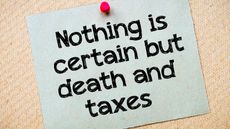Five Ways to Fund Medicare Part A
Higher taxes can help stave off the projected 2036 insolvency of Medicare's Hospital Insurance trust fund.


Getting the right tax advice and tips is vital in the complex tax world we live in. The Kiplinger Tax Letter helps you stay right on the money with the latest news and forecasts, with insight from our highly experienced team (Get a free issue of The Kiplinger Tax Letter or subscribe). You can only get the full array of advice by subscribing to the Tax Letter, but we will regularly feature snippets from it online, and here is one of those samples…
There’s decent news on the Medicare front. Notably, the Hospital Insurance Trust Fund (HITF) that's used to pay Medicare Part A benefits for recipients. The HITF is expected to be solvent for longer. According to current projections from Medicare trustees, the HITF would be able to fully pay scheduled benefits until 2036, five years later than last year’s forecast. That’s because federal payroll taxes fund the HITF, and the number of covered workers who pay the taxes, and their average wages, are forecasted to be higher. The HITF is mainly funded by Medicare taxes. And currently, there are three Medicare taxes:
- First, a 1.45% Medicare tax is levied on both employees (through payroll tax withholding) and employers with respect to workers’ wages and salaries, with no cap on taxable earnings.
- Second, a 2.9% Medicare tax is imposed on people with self-employment earnings, again with no cap.
- Third, individuals pay an additional 0.9% Medicare surtax once their wages and/or self-employment income exceed $200,000 for single filers and $250,000 for joint filers. This extra 0.9% surtax does not hit employers.
Despite the good news, experts are always looking to shore up the HITF. Let’s look at ideas to raise revenues. Not surprisingly, they involve tax hikes.

Sign up for Kiplinger’s Free E-Newsletters
Profit and prosper with the best of expert advice on investing, taxes, retirement, personal finance and more - straight to your e-mail.
Profit and prosper with the best of expert advice - straight to your e-mail.
1. President Biden wants to hit upper-income individuals with more taxes.
He would hike the current 0.9% Medicare surtax imposed on employees and self-employed people to 2.1% for taxpayers with over $400,000 of earned income.
2. He also wants to raise the net investment income tax rate from 3.8% to 5% on individuals with modified adjusted gross incomes over $400,000. The 3.8% NII tax now applies to singles with modified AGIs over $200,000, or $250,000 for joint filers. Biden would also expand the tax to cover more business income than it currently does.
3. Biden would also redirect NII tax revenues to Medicare’s HITF.
Though enacted under Obamacare, money from the NII tax has gone into general revenue for years.
4. Here’s a somewhat controversial idea set forth by some think tanks: Have workers pay Medicare tax on employer-paid health insurance.
Employer-paid health premiums are now excluded from an employee’s taxable wages. The tax exclusion for these health benefits is very costly, and either eliminating it or narrowing it can generate lots of revenue that can help support the HITF. One option is to subject all or part of the employer-paid insurance premiums to the 1.45% and 0.9% Medicare taxes paid by employees. A limited approach would impose these Medicare taxes only on employer-paid insurance of high earners.
5. Imposing an excise tax on sugary beverages has also been suggested.
For example, levying a federal excise tax of three cents per 12 ounces of sodas and other sugar-sweetened beverages and dedicating the revenues to the HITF.
Lawmakers have lots of time to flesh out revenue and cost-saving options to secure the HITF’s future. Let’s hope they don’t wait until the last minute to act.
This first appeared in The Kiplinger Tax Letter. It helps you navigate the complex world of tax by keeping you up-to-date on new and pending changes in tax laws, providing tips to lower your business and personal taxes, and forecasting what the White House and Congress might do with taxes. Get a free issue of The Kiplinger Tax Letter or subscribe.

To continue reading this article
please register for free
This is different from signing in to your print subscription
Why am I seeing this? Find out more here
Get Kiplinger Today newsletter — free
Profit and prosper with the best of Kiplinger's advice on investing, taxes, retirement, personal finance and much more. Delivered daily. Enter your email in the box and click Sign Me Up.

Joy is an experienced CPA and tax attorney with an L.L.M. in Taxation from New York University School of Law. After many years working for big law and accounting firms, Joy saw the light and now puts her education, legal experience and in-depth knowledge of federal tax law to use writing for Kiplinger. She writes and edits The Kiplinger Tax Letter and contributes federal tax and retirement stories to kiplinger.com and Kiplinger’s Retirement Report. Her articles have been picked up by the Washington Post and other media outlets. Joy has also appeared as a tax expert in newspapers, on television and on radio discussing federal tax developments.
-
Five Top Causes of Business Bankruptcy and How to Avoid Them
Drawing from experience, this article explores the five biggest reasons companies go bankrupt and provides insights into the lessons learned from these case studies.
By Stephen Nalley Published
-
 Best US Cities for Renters 2024
Best US Cities for Renters 2024What are the best U.S. cities for renters? Charleston, NC, Atlanta, GA, Sarasota, FL, McKinney, TX and Scottsdale, AZ lead the pack, according to a recent RentCafe report.
By Kathryn Pomroy Last updated
-
Landlord With Rental Income? See if You Qualify for a 20% Tax Break
The Tax Letter Many landlords are eligible to take the 20% tax deduction for qualified business income
By Joy Taylor Published
-
QCDs Are a Tax-Smart Way for Retirees To Donate to Charity
The Tax Letter With QCDs, retirees can save on taxes by making donations from their IRAs directly to charity. Here's what you need to know about qualified charitable distributions.
By Joy Taylor Published
-
The IRS is Ramping up Tax Audits
The Tax Letter Wealthy individuals, large corporations and partnerships are all audit targets, thanks in large part to the IRS's multi-billion dollar windfall.
By Joy Taylor Published
-
Medicare Tax: Five Things Every Worker Needs to Know
Payroll Taxes It's important to know how Medicare tax works.
By Kelley R. Taylor Last updated
-
 Biden's Plans to Impose an Income Tax on Death
Biden's Plans to Impose an Income Tax on DeathThe Tax Letter The president has proposed a new taxing regime that would make death an income tax realization event for wealthy decedents.
By Joy Taylor Last updated
-
 Key Tax Provisions That Are Expiring After 2025
Key Tax Provisions That Are Expiring After 2025The Tax Letter Unless Congress decides to act, lots of tax changes will take effect in 2026, including higher tax rates and lower standard deductions.
By Joy Taylor Published
-
Knowing How to Compute Tax Basis in Your Home Can Save You Money
The Tax Letter Whether you're selling or buying a home, you'll want to know how to compute tax basis. It could save you on taxes when you sell.
By Joy Taylor Published
-
Tax Tips for Transferring Excess 529 Plan Funds to Roth IRAs: The Tax Letter
The Tax Letter 529 plans can help blunt the cost of paying for college. But if you want to use leftover funds there are some tax tips to bear in mind.
By Joy Taylor Published






